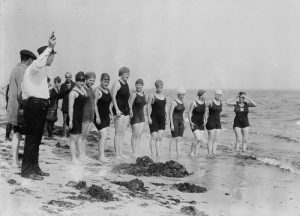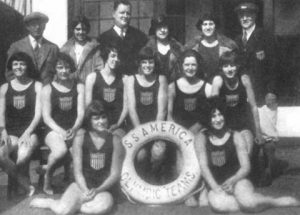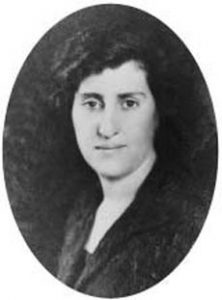Hello swimming enthusiasts!
Today, we’ll be traveling all the way back to the year 1912, when Charlotte “Eppy” Epstein became president of the National Women’s Life Saving League. What better way to celebrate women’s achievements in swimming than by examining the life of a woman known as the “Mother of Women’s Swimming in America?!”
In the United States in the 1910s, a group of female swimming pioneers known as “swimming suffragettes” linked the push for women’s access to swimming with the larger women’s suffrage movement. Women would gain physical freedom in the pool and political freedom at the polls. In those days, however, liberation through swimming seemed far away for women. After all, female swimmers had to cover their whole body with a heavy “bathing costume” that weighed them down in the water and were discouraged from competing in races, especially those that were public. Clearly, the odds were against women who had aspirations in the sport.
Annette Kellerman transformed swimming for women when she introduced the one-piece bathing suit. You can read all about her in this post from 2015. Today, though, I’ll be highlighting another woman at the forefront of the swimming suffragette efforts: Charlotte Epstein. Epstein was born to a Jewish family in 1884 in New York City and always enjoyed swimming. As an active member of the National Women’s Life Saving League and the founder of the Women’s Swimming Association (WSA), Epstein recognized the literal and symbolic importance of allowing women to have equal opportunities in the pool. The National Women’s Life Saving League recognizes how important it is for women and girls to learn basic water safety skills to avoid drowning, while the WSA helped women fight for more efficient suits, greater variety in races, and an opportunity to compete in the Olympics. Epstein, although never an outstanding swimmer herself, was a key figure in allowing women to swim in national and international competitions. She managed and chaperoned the US women’s Olympic team in 1920, 1924, and 1932, and helped produce swimming stars like Claire Galligan, Ethelda Bliebtrey, Gertrude Ederle, Eleanor Holm, and Martha Norelius.
By motivating young women to follow their passions in a sport that did not yet fully accept them, Epstein truly changed the way women thought about swimming. And her impact did not end in the pool; once women gained freedom over their bodies in sports, they were better able to achieve liberation in other facets of society. The WSA’s slogan was “Good Sportsmanship Is Greater Than Victory.” Epstein recognized that the organization’s goals went beyond just fast swimming; they were making a statement about the power of women.
 Women prepare for a swim race organized by the National Women’s Lifesaving League.
Women prepare for a swim race organized by the National Women’s Lifesaving League.

Charlotte Epstein poses in the back row, second from right, with the 1924 American Olympic team.
References
https://www.makers.com/blog/women-water-history-incredible-female-swimmers-photo-gallery
https://www.atlasobscura.com/articles/women-swimming-pioneers-suffrage
http://sports.nyhistory.org/charlotte-epstein/
Photos
https://www.pinterest.com/pin/354658539377891448/
https://jwa.org/encyclopedia/article/Epstein-Charlotte

